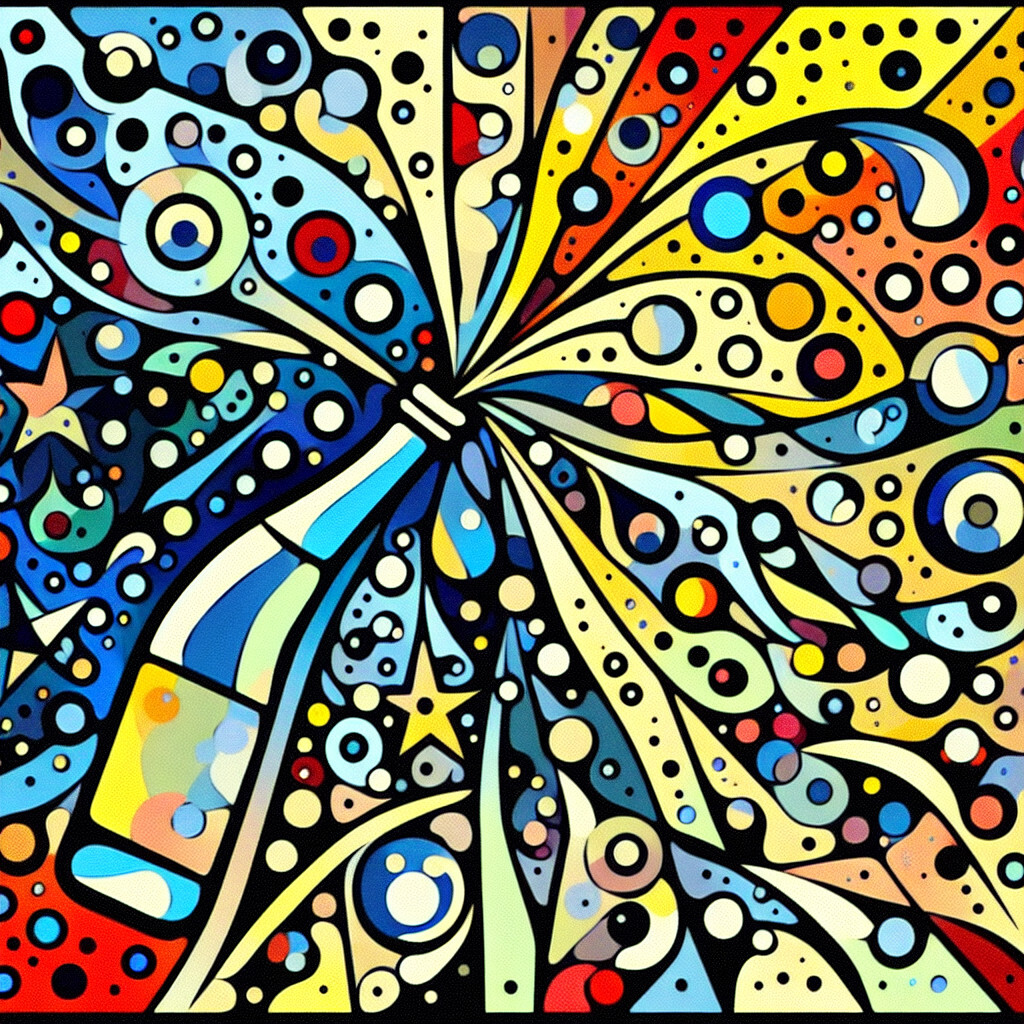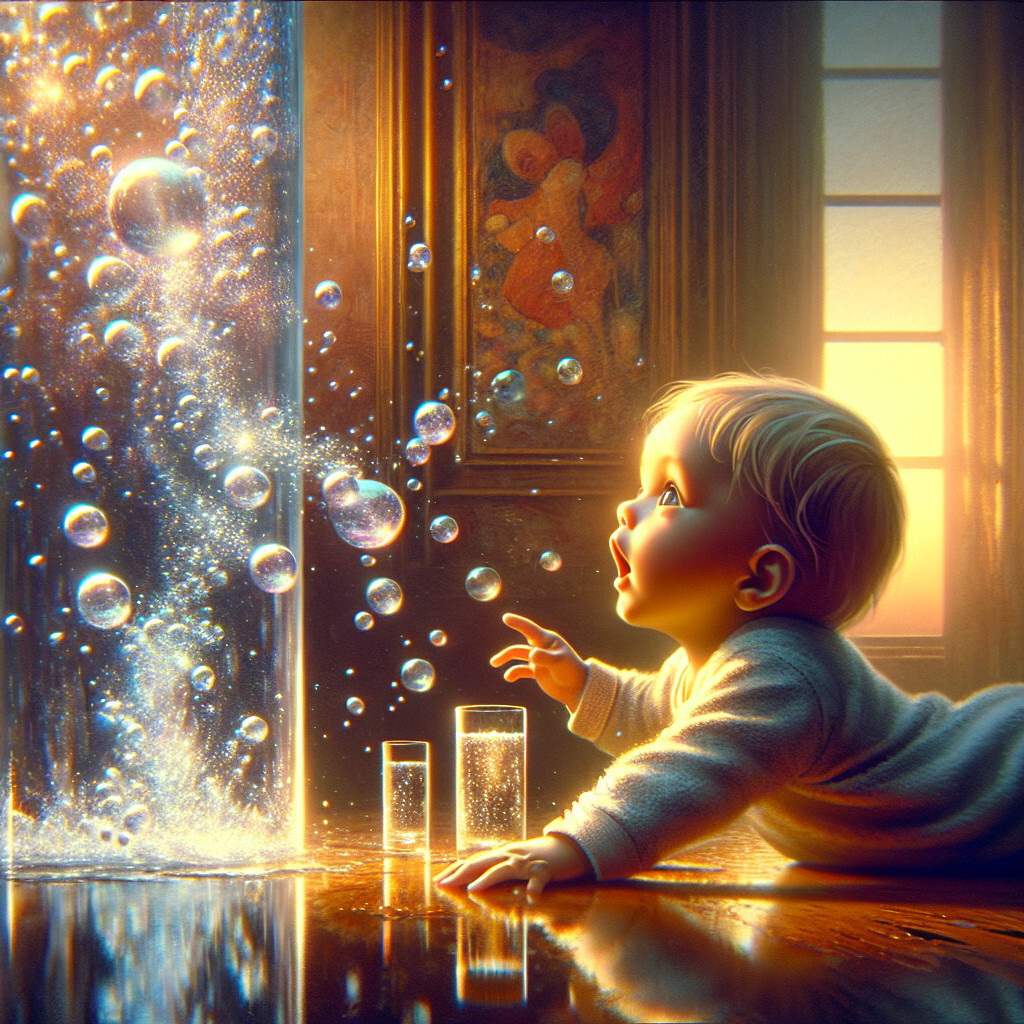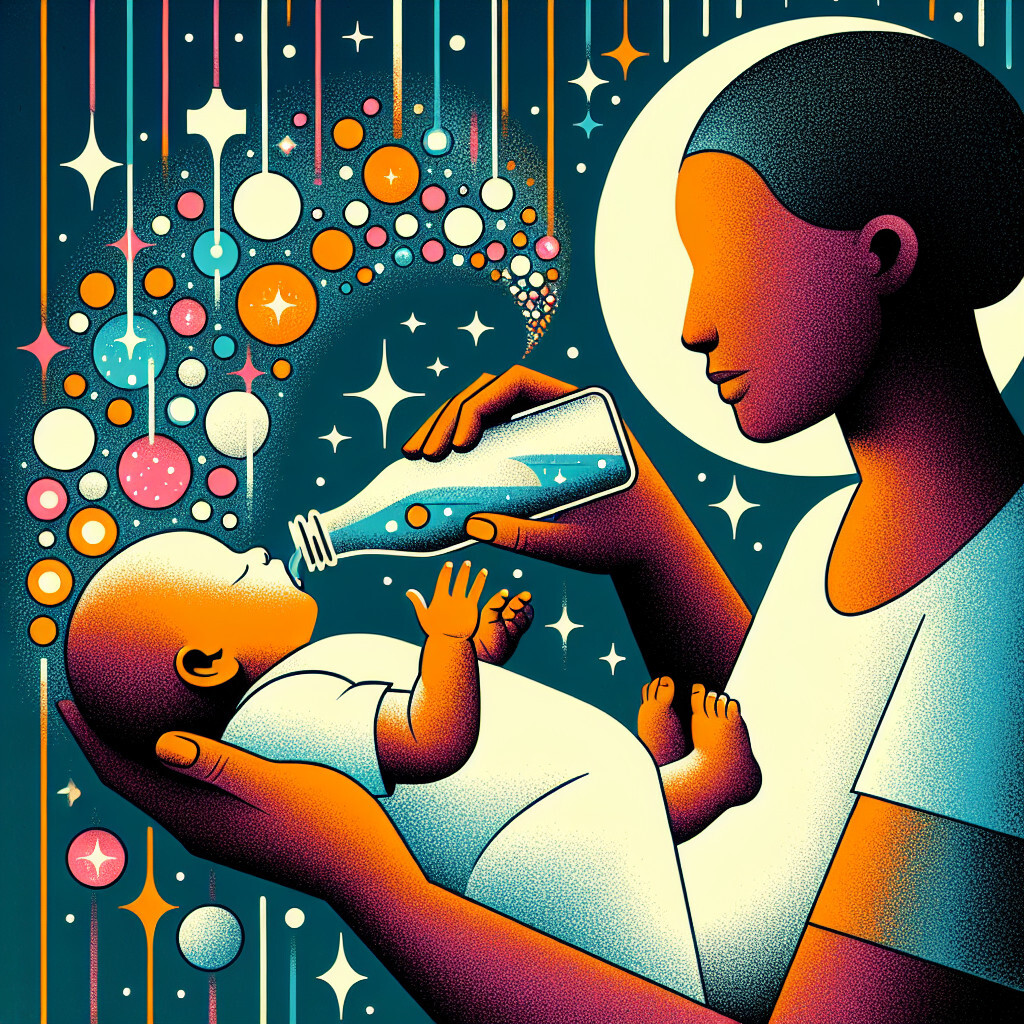-
Table of Contents
“Tiny Bubbles, Big Delight: Sparkling Water for Babies”
Introduction

Sparkling water in babies refers to the practice of giving infants carbonated water, a beverage that has been infused with carbon dioxide gas under pressure, resulting in a fizzy drink. While it is a popular refreshment for adults, its suitability for babies is a topic of discussion due to potential health concerns such as tooth decay, choking hazards, and digestive issues. It’s important to note that pediatricians generally recommend exclusive breastfeeding or formula feeding for the first six months, followed by the gradual introduction of solid foods and non-carbonated water.
Understanding the Effects of Sparkling Water on Babies
Sparkling water, also known as carbonated water, has gained popularity in recent years as a refreshing, calorie-free alternative to sugary drinks. While it’s a healthy choice for adults, many parents wonder if it’s safe to give sparkling water to their babies. This article aims to shed light on the effects of sparkling water on babies and provide a comprehensive understanding of its potential impacts.
Firstly, it’s essential to understand what sparkling water is. It’s simply water into which carbon dioxide gas has been dissolved under pressure, resulting in a fizzy drink. It doesn’t contain sugar, calories, or caffeine, which makes it a healthier alternative to soda or other sweetened beverages. However, when it comes to babies, the situation is a bit more complex.
Babies have a delicate digestive system that is still developing. The introduction of sparkling water can cause discomfort due to the gas bubbles it contains. These bubbles can lead to bloating, gas, and indigestion in babies. Moreover, the sensation of carbonation might be too strong for a baby’s sensitive palate and could potentially cause choking.
Furthermore, sparkling water is typically more acidic than regular water due to the carbonation process. This acidity can harm a baby’s tooth enamel, leading to dental issues in the future. Even though baby teeth are temporary, maintaining their health is crucial for the proper development of permanent teeth.
Another point to consider is the lack of nutritional value in sparkling water. Babies need nutrient-rich liquids like breast milk or formula to support their rapid growth and development. While sparkling water isn’t harmful in this regard, it doesn’t provide any nutritional benefits. Therefore, it shouldn’t replace essential fluids in a baby’s diet.
However, it’s important to note that not all sparkling waters are created equal. Some brands add sodium, artificial sweeteners, or other additives to their products. These ingredients can be harmful to babies in large amounts. Therefore, if parents choose to give their babies sparkling water, they should carefully read the labels and opt for products without added ingredients.
In conclusion, while sparkling water isn’t inherently harmful to babies, it’s not the best choice due to potential digestive discomfort, dental concerns, and lack of nutritional value. It’s always best to consult with a pediatrician before introducing any new foods or drinks into a baby’s diet. They can provide personalized advice based on the baby’s age, health, and developmental stage.
Remember, every baby is unique, and what works for one might not work for another. As parents, it’s our responsibility to make informed decisions about our children’s nutrition. While sparkling water might be a refreshing change for adults, it’s best to stick with breast milk, formula, or plain water for babies. As they grow and their digestive systems mature, there will be plenty of time for them to enjoy a wider variety of foods and drinks.
The Pros and Cons of Giving Sparkling Water to Babies
Sparkling water, also known as carbonated water, has gained popularity in recent years as a refreshing and healthier alternative to sugary drinks. However, when it comes to babies, parents often wonder whether it’s safe to introduce this fizzy beverage into their little one’s diet. This article aims to shed light on the pros and cons of giving sparkling water to babies.
On the positive side, sparkling water is free from sugars, artificial sweeteners, and calories, making it a healthier choice compared to sugary drinks. It can also be a fun way to introduce a new texture and sensation to your baby’s palate. The bubbles in sparkling water can provide a novel experience for your baby, potentially making them more open to trying new foods and drinks in the future.
Moreover, sparkling water can be a good source of hydration. Just like regular water, it helps to replenish fluids and maintain hydration levels in the body. This can be particularly beneficial during hot weather or when your baby is unwell and needs to stay hydrated.
However, despite these benefits, there are several reasons why sparkling water may not be the best choice for babies. Firstly, the carbonation in sparkling water can cause gas and bloating, leading to discomfort and potential upset for your little one. Babies have immature digestive systems that may struggle to handle the bubbles in sparkling water, leading to increased burping or even reflux.
Secondly, while sparkling water is not inherently harmful to teeth, it is slightly more acidic than regular water due to the carbonation process. This acidity could potentially contribute to tooth decay, especially if your baby’s teeth are not regularly and properly cleaned. Therefore, if you do choose to give your baby sparkling water, it should be done sparingly and not replace regular water or milk as their primary drink.
Furthermore, the sensation of the bubbles can be overwhelming for some babies. While some may enjoy the novelty, others may find it unpleasant or even frightening. It’s important to remember that every baby is different, and what works for one may not work for another.
Lastly, it’s worth noting that while sparkling water is a healthier alternative to sugary drinks, it does not offer any additional nutritional benefits over regular water. Babies under six months should only be given breastmilk or formula, as these provide all the necessary nutrients for their growth and development. For older babies, while water can be introduced, it should not replace breastmilk or formula as the main source of nutrition.
In conclusion, while sparkling water can be a fun and refreshing drink, it may not be suitable for all babies due to potential digestive discomfort and its slightly acidic nature. If you decide to introduce sparkling water to your baby, it should be done gradually and under the guidance of a healthcare professional. Always remember that the primary source of hydration and nutrition for babies should be breastmilk or formula, with water introduced as a supplementary drink as they grow older.
Exploring the Nutritional Value of Sparkling Water for Babies
Sparkling water, also known as carbonated water, has gained popularity in recent years as a refreshing and healthier alternative to sugary drinks. However, when it comes to babies, parents often wonder if it’s safe to introduce sparkling water into their diet. This article aims to explore the nutritional value of sparkling water for babies and provide a comprehensive understanding of its potential benefits and drawbacks.
Firstly, it’s essential to understand what sparkling water is. It’s simply water that has been infused with carbon dioxide under pressure, which gives it its characteristic fizz. It doesn’t contain any sugars, calories, or artificial additives, making it a healthier choice compared to sugary beverages. However, the nutritional value of sparkling water for babies is virtually non-existent, as it doesn’t provide any vitamins, minerals, or other nutrients that are crucial for a baby’s growth and development.
While sparkling water is not harmful per se, it’s not particularly beneficial for babies either. Babies have a delicate digestive system that is still developing, and the carbonation in sparkling water can cause discomfort, such as bloating and gas. Moreover, the bubbles can make a baby feel full quickly, potentially interfering with their regular feeding and leading to inadequate nutrient intake.
Furthermore, the acidity in sparkling water can be problematic. Carbonated water has a lower pH than regular water, making it more acidic. This acidity can potentially harm a baby’s tooth enamel and contribute to tooth decay, especially if the baby’s teeth are frequently exposed to the carbonated water. Therefore, it’s advisable to limit the consumption of sparkling water in babies to protect their oral health.
It’s also worth noting that while sparkling water is free of sugars and artificial additives, flavored varieties may not be. Some flavored sparkling waters contain added sugars or artificial sweeteners, which can contribute to obesity and tooth decay. Therefore, if parents choose to give their babies sparkling water, it’s crucial to opt for the unflavored variety and avoid those with added sugars or sweeteners.
In conclusion, while sparkling water is not inherently harmful to babies, it doesn’t offer any significant nutritional benefits either. Its carbonation can cause digestive discomfort, and its acidity can potentially harm a baby’s tooth enamel. Moreover, it can interfere with a baby’s regular feeding and lead to inadequate nutrient intake. Therefore, it’s best to stick to breast milk or formula for babies under six months of age, and introduce plain water after six months, as recommended by pediatricians. Sparkling water can be introduced gradually as the child grows older and their digestive system becomes more robust. However, it should not replace regular water or other nutritious beverages in a child’s diet. As always, when introducing any new food or drink to a baby’s diet, it’s advisable to consult with a healthcare professional or pediatrician.
Safety Measures When Introducing Sparkling Water to Babies
Sparkling water, also known as carbonated water, has gained popularity in recent years as a refreshing and healthier alternative to sugary sodas. However, when it comes to introducing sparkling water to babies, parents and caregivers should exercise caution and adhere to certain safety measures.
Firstly, it is important to understand that the digestive system of babies is not as developed as that of adults. The carbonation in sparkling water can cause discomfort and bloating in babies, leading to fussiness and potential sleep disturbances. Therefore, it is advisable to wait until a child is at least one year old before introducing sparkling water. Even then, it should be given in moderation and not as a replacement for regular water or breast milk, which are essential for a baby’s growth and development.
Secondly, sparkling water can be acidic due to the carbonation process. This acidity can potentially harm a baby’s developing teeth. Regular exposure to acidic drinks can lead to dental erosion, a condition where the enamel of the teeth is worn away. This can cause sensitivity and increase the risk of cavities. Therefore, if you choose to give your baby sparkling water, it should be done sparingly and not be used as a regular drink.
Thirdly, it is crucial to ensure that the sparkling water you give your baby is free from added sugars, artificial sweeteners, and flavors. These additives can not only harm your baby’s teeth but also contribute to unhealthy weight gain and other health problems later in life. Always read the label carefully and opt for plain sparkling water.
Moreover, it is worth noting that while sparkling water is hydrating, it does not quench thirst as effectively as still water. This is because the bubbles can make a person feel full before they have drunk enough to hydrate properly. This could potentially lead to dehydration in babies, especially in hot weather or when they are unwell.
In addition, the sensation of the bubbles in sparkling water can be strange and even frightening for a baby. It is a completely new experience for them, and they may not like it. If your baby shows signs of distress or discomfort after drinking sparkling water, it is best to stop giving it to them and stick to still water.
In conclusion, while sparkling water is not harmful to babies in small amounts, it should not be introduced too early or used as a regular drink. It is always best to consult with a pediatrician or a registered dietitian before introducing any new foods or drinks to your baby’s diet. They can provide personalized advice based on your baby’s age, health, and developmental stage. Remember, the goal is to ensure that your baby’s nutritional needs are met in the safest and healthiest way possible.
Q&A
1. Question: Is it safe to give sparkling water to babies?
Answer: No, it’s not recommended to give sparkling water to babies. The carbonation can cause gas and discomfort.
2. Question: Why shouldn’t babies drink sparkling water?
Answer: The carbonation in sparkling water can cause gas and bloating in babies. It also lacks the nutrients they need for healthy growth and development.
3. Question: Can sparkling water be used to prepare baby formula?
Answer: No, sparkling water should not be used to prepare baby formula. Only use clean, safe drinking water to prepare baby formula.
4. Question: At what age can a child start drinking sparkling water?
Answer: It’s generally safe for children to start drinking sparkling water around the age of 2, but it’s always best to consult with a pediatrician first.
Conclusion
In conclusion, sparkling water is not recommended for babies due to its high acidity levels which can harm their developing teeth and delicate digestive systems. It’s best to stick to breast milk, formula, or plain water for hydration.





